Portugal Real Estate Beachfront Guide
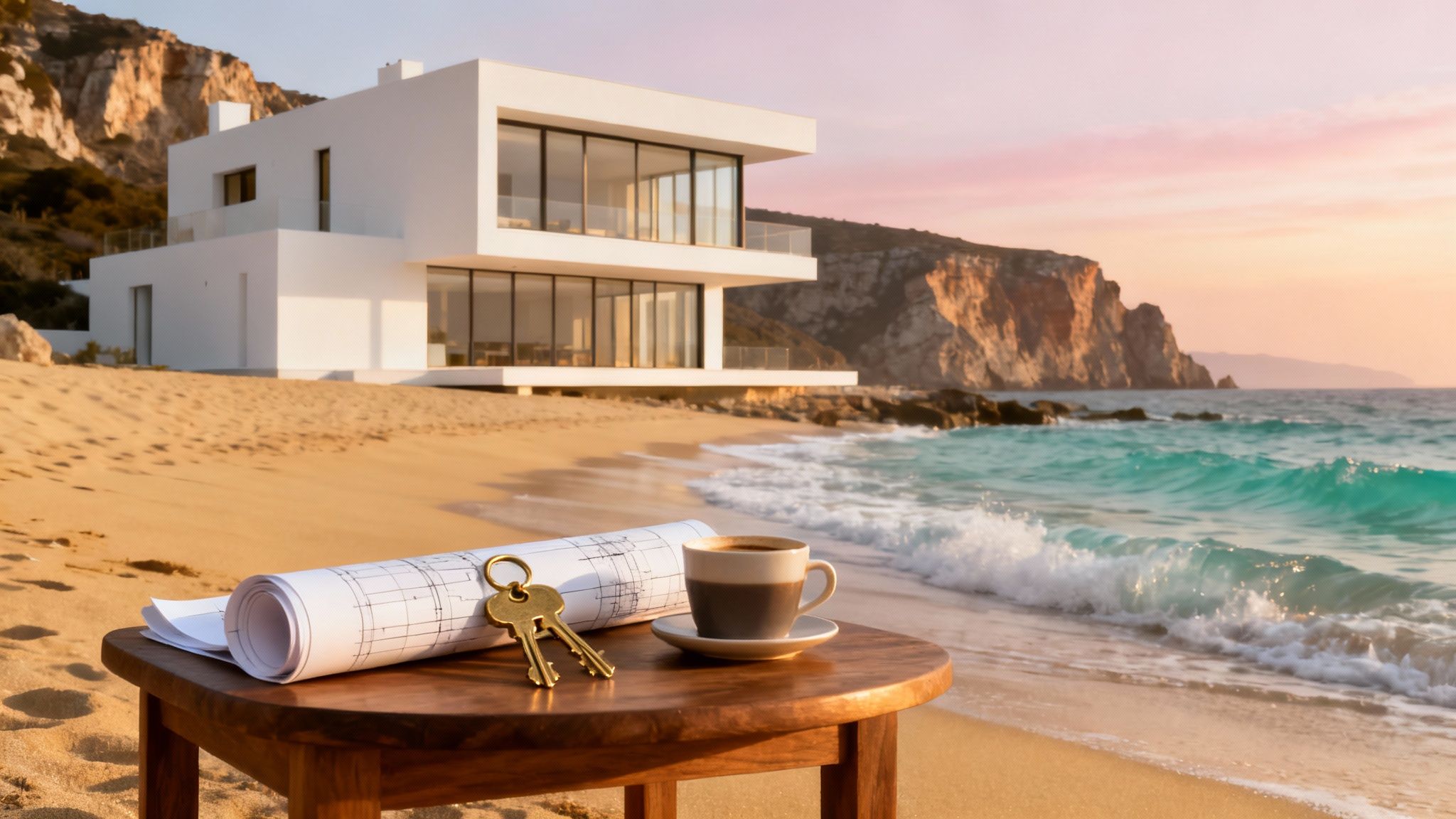
Owning a piece of Portugal's beachfront isn't just about buying property; it's about investing in a way of life. We're talking about more than 300 days of sunshine a year, a vibrant culture, and the soothing sound of the Atlantic Ocean right on your doorstep. It’s a rare chance to merge pure personal enjoyment with a smart, appreciating asset.
Why Choose Portugal for Your Beachfront Home?
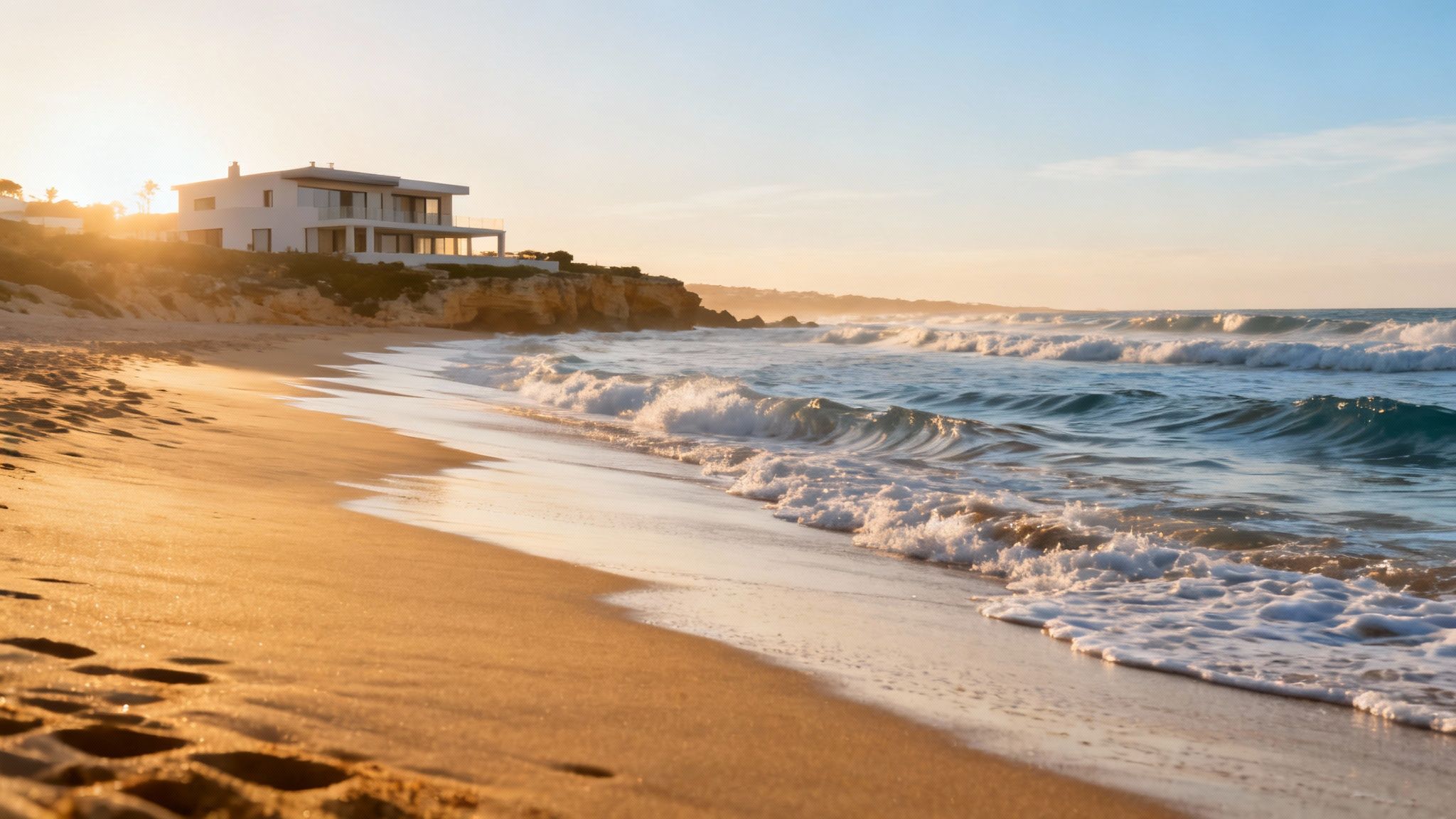
Picture this: you wake up to the gentle sound of waves, walk out onto your sun-soaked terrace, and watch the golden coastline light up. For those who invest in Portugal's stunning coastal properties, this isn't just a daydream—it's daily life. But the appeal runs much deeper than the beautiful scenery. It’s about securing a foothold in a country known for its safety, incredible quality of life, and genuinely welcoming people.
Portugal consistently lands on lists of the safest and most desirable places to live in the world. That feeling of security, paired with a cost of living that's noticeably lower than in many other Western European countries, creates a magnetic pull for international buyers, retirees, and investors alike. Whether you're after the historic charm of a small coastal town or the modern buzz of a resort area, you'll find a lifestyle that can be as laid-back or as lively as you want it to be.
A Market Built on Strong Foundations
The Portuguese property market has proven itself to be remarkably resilient. Unlike some markets that see wild, unpredictable swings, Portugal’s real estate sector is propped up by steady demand from both locals and foreigners. This stability is a huge part of why so many people feel it's a safe place to put their money.
In fact, Portugal’s residential market has recently outpaced many of its European neighbors in price growth, especially in those highly sought-after coastal spots. According to Statistics Portugal (INE), the median house price per square meter has seen significant quarterly growth—one of the sharpest increases since 2019. For a closer look at these market dynamics, you can find detailed reports and insights at Portugal Homes.
More Than Just a Home, It’s a Lifestyle
When you buy Portugal real estate beachfront, you're really investing in experiences. Think world-class golf courses in the Algarve, legendary surf breaks along the Silver Coast, and unforgettable local cuisine everywhere you turn. The lifestyle opportunities are simply endless. The country's rich history, friendly communities, and natural beauty transform a simple property purchase into a ticket to a whole new way of living.
Owning a home on Portugal's coast provides a unique combination of benefits: a tangible, appreciating asset and an intangible, priceless enhancement to your quality of life. It’s an investment that pays dividends in both financial returns and personal well-being.
To put it simply, here’s a quick look at the core benefits driving investors and lifestyle buyers to Portugal's coast.
Key Advantages of Buying Beachfront Property in Portugal
| Benefit | Description |
|---|---|
| Exceptional Quality of Life | A safe, affordable, and relaxed lifestyle with access to beautiful beaches, excellent food, and rich cultural heritage. |
| Strong Investment Potential | A stable and growing property market with high rental demand and solid potential for capital appreciation over time. |
| Favorable Climate | One of Europe's sunniest climates makes Portugal a year-round destination, boosting both personal enjoyment and rental income. |
| Welcoming to Foreigners | A straightforward property buying process for non-residents and a large, well-established expatriate community. |
Ultimately, these factors combine to create a compelling case for why Portugal’s coastline continues to capture the attention of savvy buyers from around the globe.
Discovering Portugal's Prime Coastal Regions
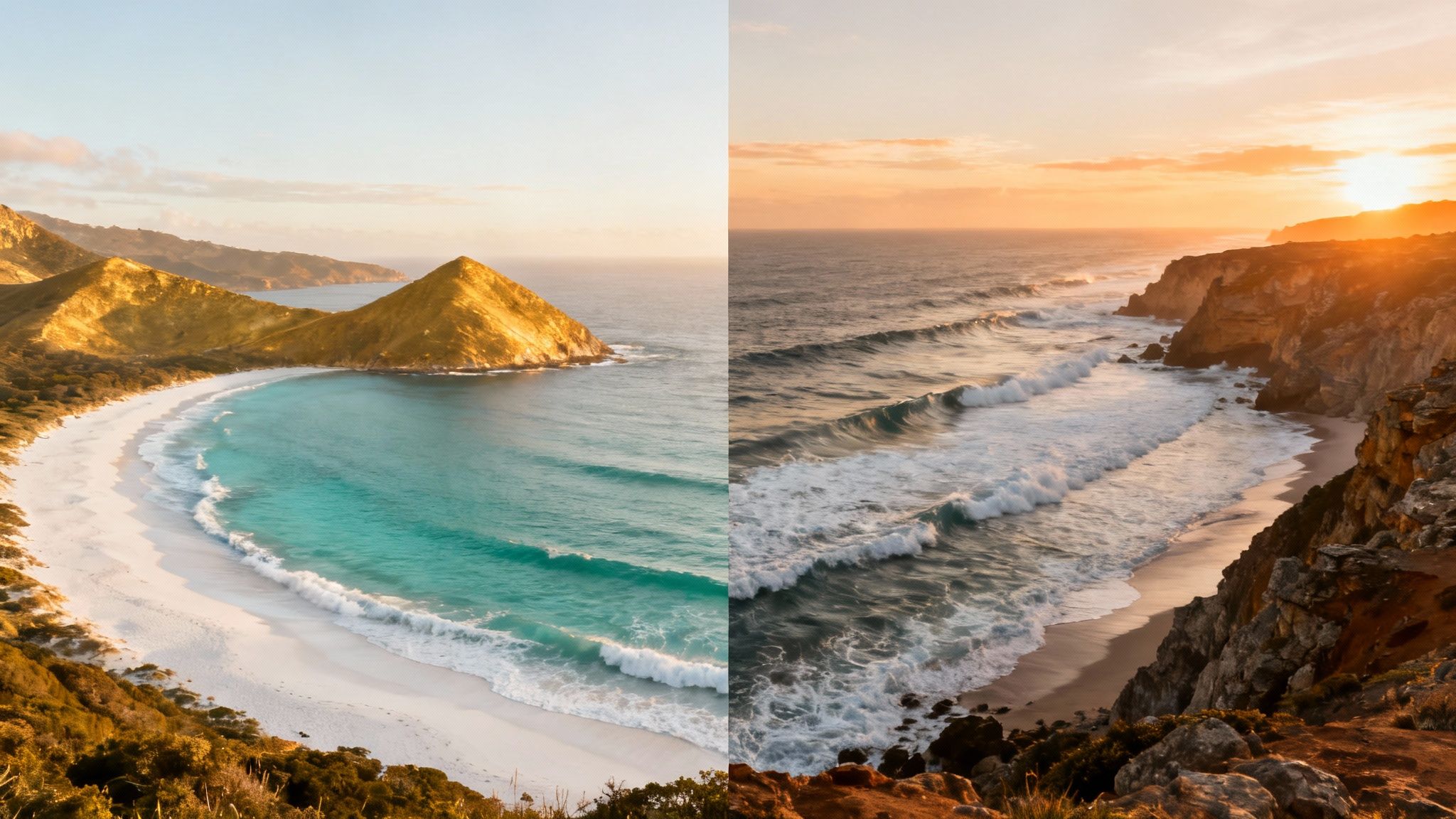
Portugal's coastline isn't just one long, uniform stretch of sand. It's a rich tapestry of distinct regions, each with its own vibe, landscape, and lifestyle. Choosing where to buy your Portugal real estate beachfront is a personal journey, much like picking a fine wine—the best choice is the one that perfectly suits your taste and goals.
From the sun-drenched, world-famous shores of the Algarve to the rugged, authentic charm of the Silver Coast, your options are incredibly diverse. Let's take a tour of the most sought-after coastal areas to help you zero in on the perfect spot for your dream home.
The Algarve: Glamour and Natural Beauty
The Algarve is, without a doubt, Portugal’s crown jewel. It's easy to see why. Tucked away in the country's southernmost region, it boasts over 300 days of sunshine a year, immaculate beaches, and top-tier amenities. But even within this celebrated region, the experience can vary dramatically from one town to the next.
The central Algarve is home to the glamorous "Golden Triangle," a chic area that includes Vilamoura, Quinta do Lago, and Vale do Lobo. This is the heart of luxury, famous for its championship golf courses, exclusive resorts, and Michelin-starred restaurants. Beachfront properties here are typically modern villas and high-end apartments that fetch premium prices.
Head over to the western Algarve, and you'll discover a more rugged, dramatic coastline around towns like Lagos and Sagres. This area is a magnet for surfers and nature lovers, offering a more laid-back vibe without compromising on beauty. Meanwhile, the eastern Algarve, near the Spanish border, delivers a more traditional Portuguese experience. The lovely town of Tavira, for example, offers a beautiful blend of historic architecture and serene island beaches. If you're looking for that authentic coastal lifestyle, you might want to explore the beautiful homes for sale in Tavira, Portugal to get a feel for the area.
The Silver Coast: Authentic Charm and Great Value
Stretching north from Lisbon all the way to Porto is the Costa de Prata, or the Silver Coast. This region is often seen as Portugal's more authentic and affordable cousin to the Algarve. It's a real haven for anyone looking to step away from the main tourist hubs and dive into genuine Portuguese culture.
The Silver Coast is defined by its wild, windswept beaches, historic fishing villages, and lush green landscapes. Towns like Nazaré, famous for its colossal waves, Peniche, a surfing hotspot, and the medieval walled town of Óbidos offer a rich and varied experience.
For buyers wanting more bang for their buck, the Silver Coast is an outstanding choice. It provides that classic beachfront lifestyle—fresh seafood, tight-knit communities, and breathtaking ocean views—at a much more accessible price point.
Property styles here range from traditional townhouses in historic centers to modern beachfront apartments and villas. The incredible value is a major draw, allowing many people to afford a larger home or a better location than they could in the south.
The Lisbon and Cascais Coast: Urban Energy Meets Seaside Living
If you crave that perfect blend of cosmopolitan buzz and coastal calm, the coastline from Lisbon to Cascais is simply unbeatable. This unique area lets you soak up the cultural vibrancy of a major European capital while living just a stone's throw from gorgeous sandy beaches.
Lisbon itself offers riverside living with incredible views, while a short, scenic train ride whisks you away to the chic coastal towns of Estoril and Cascais. Once a humble fishing village, Cascais has blossomed into a glamorous seaside resort town, now a firm favorite among discerning international buyers.
The properties here reflect the upscale nature of the region, with a mix of elegant historic mansions, modern sea-view apartments, and exclusive condominiums. Living on the Lisbon Coast means you can spend your morning surfing at Guincho Beach and your evening enjoying world-class dining and culture in the city. It’s a dynamic lifestyle that’s hard to find anywhere else.
Comparison of Top Portuguese Beachfront Regions
Choosing the right region is a big decision, and it helps to see the key differences side-by-side. This table breaks down what each of Portugal's top coastal areas has to offer.
| Region | Average Price Range (per sq. meter) | Best For | Property Types |
|---|---|---|---|
| The Algarve | €3,000 - €7,000+ | Luxury living, golf, sunny retirement | Modern villas, luxury apartments, resort complexes |
| The Silver Coast | €1,500 - €3,500 | Value, authenticity, surfing, family life | Traditional townhouses, modern homes, apartments |
| Lisbon/Cascais Coast | €4,000 - €8,000+ | Urban amenities, culture, upscale lifestyle | Historic mansions, chic apartments, condominiums |
Ultimately, whether you’re drawn to the sun-soaked luxury of the Algarve, the raw beauty of the Silver Coast, or the sophisticated energy of the Lisbon Coast, Portugal has a piece of paradise waiting for you. Each region offers a unique investment opportunity and a distinct way of life.
The market has certainly seen significant growth, particularly in the Algarve. According to recent data, the median bank appraisal for residential properties in the Algarve was approximately €11,184 per square meter for prime locations. Luxury villas outside major resorts often average around €2 million, while premier estates can command prices of €5 million or more. For a deeper dive into market trends, the price history section on the Global Property Guide is an excellent resource.
A Step-by-Step Guide to Buying Property
Jumping into the Portuguese property market can feel a little daunting at first, but it's a surprisingly well-trodden and logical path. The key is to take it one step at a time. This guide will break down the entire journey, transforming what might seem like a confusing process into a clear roadmap for owning your dream home by the sea.
Getting Your Ducks in a Row
Before you can even think about making an offer, there are two non-negotiable first steps. You absolutely must get a Número de Identificação Fiscal (NIF), which is your personal Portuguese tax number. This little number is essential for just about any major financial transaction in the country, from opening a bank account to buying a car or a home.
Speaking of which, a Portuguese bank account is the second piece of the puzzle. This account will be your financial hub for everything related to the property—handling the deposit, paying taxes, and managing ongoing bills. Getting these two essentials sorted can usually be done in a couple of weeks and lays the groundwork for everything else.
Assembling Your Professional Team
With your NIF and bank account in hand, it’s time to bring in the experts: a trustworthy, independent lawyer and a licensed real estate agent.
Your real estate agent is your scout on the ground. They have the local knowledge to find the perfect Portugal real estate beachfront property that fits your vision and your budget, often with access to listings you’d never find on your own.
Your lawyer, however, is your most critical ally. Their job goes way beyond shuffling papers. They are your chief protector, responsible for conducting deep and thorough due diligence. This means they'll dig into the property's legal history, check for any debts or liens, confirm the seller actually owns it, and scrutinize every permit and license.
To get a real sense of what this involves, our guide on the real estate due diligence checklist breaks down exactly what your legal team should be investigating to safeguard your investment.
Think of your lawyer as a home inspector for the property's legal and financial health. While you're falling in love with the ocean view, they are in the background ensuring the foundation is solid and there are no hidden problems that could surface later.
This handy visual lays out the core stages of the buying journey in Portugal, from getting prepared to finally holding the keys.
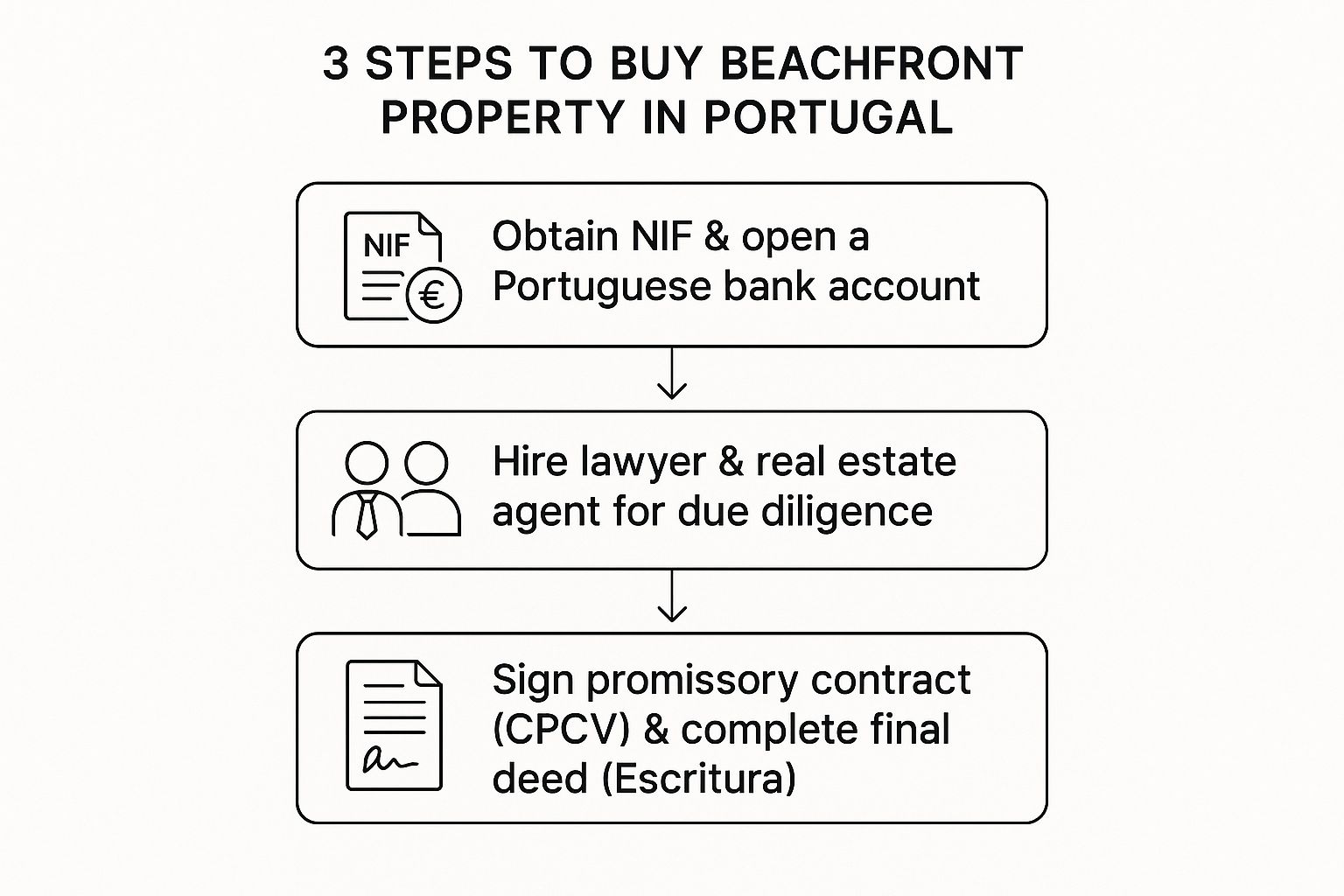
As you can see, the process is designed to be sequential and secure, giving you clarity and peace of mind at every step.
From Offer to Ownership: The Key Contracts
Once you've found "the one" and your lawyer has given it an initial all-clear, you’ll make a formal offer. If the seller accepts, you’ll move on to the first legally binding agreement: the Contrato de Promessa de Compra e Venda (CPCV), or the Promissory Contract.
This is a pivotal moment. Upon signing the CPCV, you’ll pay a deposit, which is typically between 10% and 20% of the total purchase price. This contract officially locks in the sale price and terms, committing both you and the seller to the deal.
You can think of the CPCV as a formal engagement. It's a serious, legally binding promise to go through with the purchase. If you back out without a valid legal reason, you’ll lose your deposit. On the flip side, if the seller gets cold feet, they are generally obligated to pay you back double your deposit.
After the CPCV is signed, there's usually a window of 30 to 90 days for final checks to be completed and financing to be finalized. When all is said and done, you move to the final step: the Escritura, or the Final Deed. This is the big day.
The Escritura is signed in front of a public notary. At this meeting, you'll pay the remaining balance of the purchase price, plus any applicable taxes like the IMT (Property Transfer Tax) and Stamp Duty. Once the ink is dry and the deed is registered at the Land Registry Office (Conservatória do Registo Predial), the keys are yours. You are now the official owner of a stunning beachfront property in Portugal.
Understanding the Taxes and Fees Involved
Nobody likes financial surprises, especially when you're making a major investment like buying a home by the sea. The good news is that the costs of purchasing Portugal real estate beachfront are actually quite straightforward once you know what to expect. Think of it like mapping out a road trip—knowing all the tolls and stops ahead of time makes for a much smoother journey.
The first costs you'll run into are the one-time transaction taxes you pay at the time of purchase. These are the biggest fees you'll face outside of the property price itself.
The Key Purchase Taxes
When you go to close the deal, two main taxes will come into play: the Property Transfer Tax (IMT) and Stamp Duty (Imposto de Selo).
- Property Transfer Tax (IMT): This is the big one. It’s calculated on a sliding scale, meaning the rate changes based on the property's price, its type (urban vs. rural), and whether it's your main home or a vacation spot. For a primary residence, the rates can climb up to 7.5%, while second homes and investment properties often face a flat rate of 6.5% over a certain price point.
- Stamp Duty (Imposto de Selo): This one is much simpler—it’s a flat-rate tax of 0.8% of the property’s declared value. This tax is a standard part of many legal agreements in Portugal, and buying a home is no different.
Let's put that in perspective. On a €400,000 beachfront apartment bought as a second home, you should be ready for a combined IMT and Stamp Duty bill of over €29,000. You'll pay these taxes directly to the notary right before signing the final deed.
Planning for these upfront costs is absolutely critical. As a rule of thumb, smart buyers budget an extra 6-10% of the purchase price to cover all the taxes, notary fees, and legal help.
Ongoing Ownership Costs
Once you have the keys, your financial responsibilities shift from one-off purchase costs to annual ownership taxes. The main one to know is the Annual Municipal Property Tax, or IMI.
IMI (Imposto Municipal sobre Imóveis) is basically Portugal's version of council tax or property tax. It’s calculated on the property’s registered tax value (Valor Patrimonial Tributário, or VPT), which is almost always lower than the price you actually paid.
The local municipality sets the IMI rate, which usually lands somewhere between 0.3% and 0.45% of the VPT for city and town properties. So, for a home with a tax value of €250,000, you could expect an annual IMI bill between €750 and €1,125. Getting a handle on these international tax differences is a must for any foreign buyer, and our guide on foreign real estate tax dives deeper into this.
Planning for the Future
It’s also smart to think about what might happen down the road, particularly with Capital Gains Tax. If you ever decide to sell your Portuguese property, any profit you make on the sale could be taxed.
For non-residents, the net profit is usually taxed at a flat rate. Residents, however, can often get a better deal, especially if they reinvest the money into another main home in the EU or EEA. Knowing this from day one helps you make smarter long-term decisions and lets you plan your purchase with total confidence.
Making Your Portuguese Dream Home a Reality: The Finances
So, you've found the perfect spot on the coast. Now comes the big question: how do you pay for it? This is where the dream starts to feel real, and thankfully, you've got options. While a cash purchase is always the simplest route, many international buyers find that getting a mortgage in Portugal is surprisingly straightforward.
Portuguese banks are very experienced with foreign investors. In fact, they’ve built systems specifically for non-residents, so you’ll find the lending environment is professional and easy to navigate. Getting a loan for that ideal Portugal real estate beachfront property can be a smart move, freeing up your cash for renovations, furniture, or other investments.
Getting a Mortgage as a Non-Resident
When you walk into a Portuguese bank, one of the first terms you'll hear is Loan-to-Value (LTV). It sounds technical, but it’s just the bank's way of saying how much of the property's price they’re willing to lend you.
For buyers who don't live in Portugal full-time, banks typically offer an LTV between 60% and 70%. Think of it this way: you'll need to bring 30% to 40% of the purchase price to the table as a down payment. That's a good baseline to plan for, not including the extra funds for taxes and fees. If you have a particularly strong financial profile, you might get a better offer, but aiming for a 30% down payment is a safe bet.
To get the green light, the bank will want to see that you're a reliable borrower. The best way to do this is to have all your paperwork in order before you even apply. It shows them you're serious and prepared.
- Who are you? Your passport and your Portuguese tax number (NIF) are non-negotiable.
- How do you earn your money? Gather recent payslips, the last few years of tax returns, and your employment contract.
- What does your cash flow look like? Have three to six months of bank statements ready.
- Are you good with credit? You'll need a credit report from your home country.
- What are you buying? Details about the property, including the signed promissory contract (CPCV), are essential.
Getting these documents sorted out ahead of time is one of the best things you can do. It makes the whole process smoother and faster.
Fixed vs. Variable: Decoding Interest Rates
Once you're approved, you’ll face a key decision: should you go with a fixed or a variable interest rate? They each serve a different purpose, so it really comes down to your personal financial strategy.
A variable rate is directly linked to the Euribor, which is the benchmark rate for European banks. Your interest rate will be the Euribor plus the bank's margin. This means your monthly payment can go up or down as the market changes. It can be cheaper at first, but it comes with a dose of uncertainty.
A fixed rate, as the name suggests, locks in your interest rate for a set period—anywhere from 5 to 30 years. Your monthly payment will be the exact same month after month, which makes budgeting a breeze. For many people buying a second home, that kind of predictability is worth its weight in gold.
Ultimately, choosing your interest rate is about how much risk you're comfortable with. A fixed rate buys you peace of mind. A variable rate might save you money in the short term, but you have to be prepared for potential increases down the road.
Don't Forget About Currency Exchange
If you're buying with money from a non-Euro account, you can't overlook the impact of currency exchange rates. A small fluctuation between when you agree on a price and when you actually transfer the money can change your final cost by thousands.
Here’s a pro tip: don't just use your regular bank for the international transfer. Specialist currency exchange services almost always offer much better exchange rates and lower fees. By planning this part of the transaction carefully, you can save a significant amount of money and avoid any nasty surprises on closing day.
Unlocking Your Property's Investment Potential
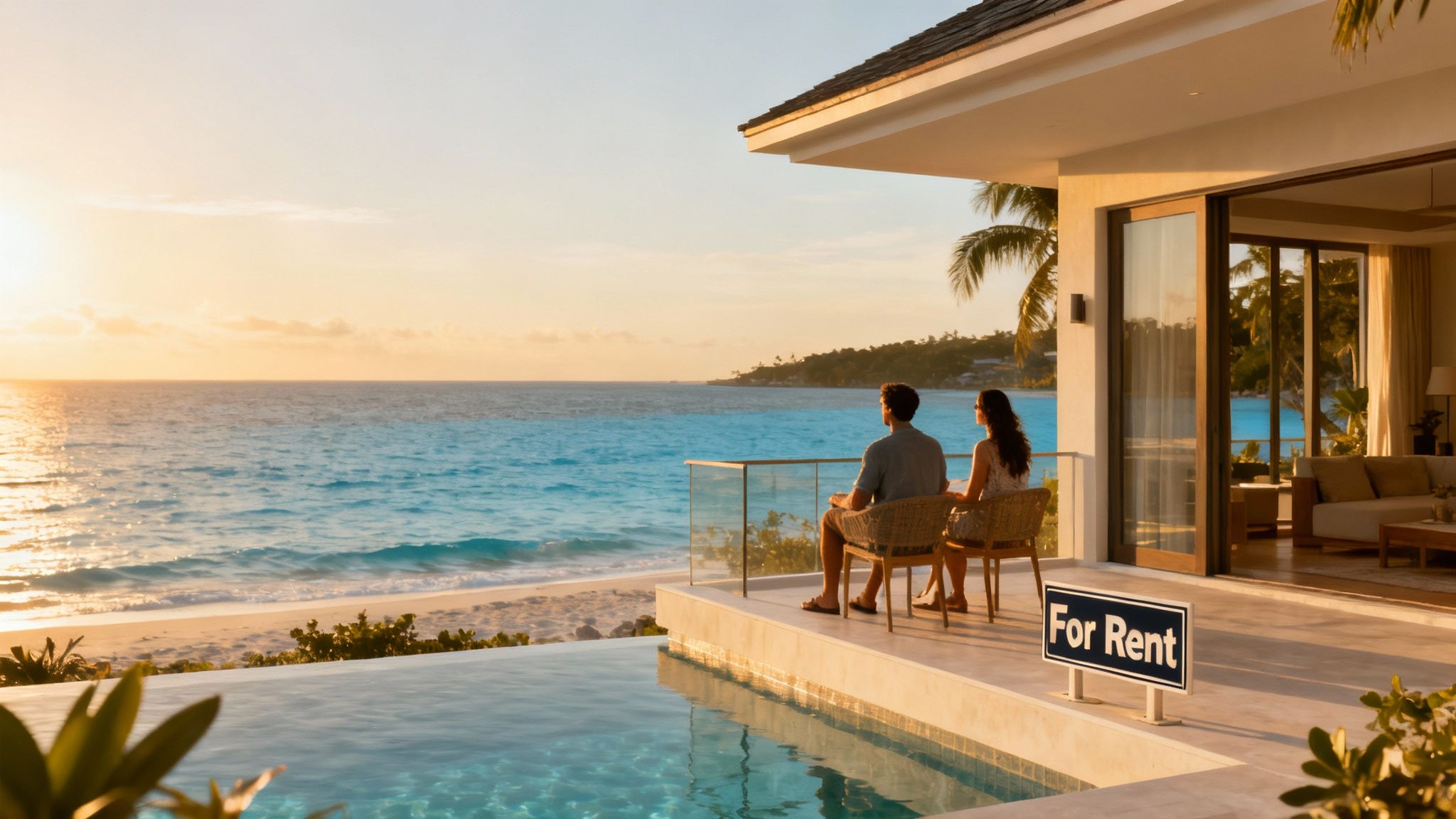
A home on the Portuguese coast is so much more than a beautiful escape. It's a living, breathing financial asset. When you look beyond the stunning sunsets and personal holidays, you’ll find a powerful opportunity for both long-term growth and immediate income. The trick is to start thinking of it as a dual-purpose investment from day one.
Portugal’s booming tourism industry is the engine that powers the rental market. Millions of visitors arrive every year hungry for a slice of coastal life, which keeps the demand for high-quality holiday lets incredibly strong. This is especially true for prime Portugal real estate beachfront properties. For owners, this creates a well-trodden path to generating serious rental income.
Maximizing Your Returns Through Rentals
To really tap into this market, you need to get familiar with rental yields—basically, the return you make from rent relative to your property's value. In Portugal's most sought-after coastal spots, you can expect gross rental yields for long-term tenants to sit in a very healthy range of 5% to 7%. But if you're playing the short-term holiday game, that number can climb even higher, especially during the sun-drenched peak season.
Of course, it's not as simple as just throwing your place up on a rental site. To operate legally and professionally, you must have an Alojamento Local (AL) license. This is a non-negotiable for anyone renting to tourists on a short-term basis. Getting your AL license squared away keeps you on the right side of the law, helps you avoid hefty fines, and positions your property as a legitimate and trustworthy option for visitors.
Think of the AL license as your official key to unlocking the high-demand tourist market. It transforms your private home into a professional, income-generating business that can dramatically offset your ownership costs and build wealth.
Beachfront real estate is the crown jewel of Portugal’s property market. Just look at the Algarve, where demand for luxury villas and holiday homes continues to surge, with buyer inquiries climbing significantly year over year. While this shows just how strong the market is, it's also worth noting that recent regulatory changes are starting to shape investment strategies, nudging some owners towards more stable, long-term rental models. You can get a deeper dive by exploring detailed insights into Portugal's market outlook.
Playing the Seasons: Peak vs. Off-Peak
A smart investor learns to master the rhythm of the rental calendar. Your income won't be a flat line; it will ebb and flow with the seasons.
- Peak Season (June-September): This is your primetime. Demand goes through the roof, allowing you to set premium rates with occupancy often hitting 100%. These few months are absolutely critical for maximizing your annual revenue.
- Off-Peak Season (October-May): Things quiet down, but they don't stop. Thanks to Portugal's mild climate, you'll still have visitors. This is the time to get creative by offering competitive rates to attract different crowds, like digital nomads or retirees looking for a longer, quieter stay.
By skillfully balancing these seasons, your beachfront property becomes more than a place to make memories. It matures into a hard-working financial asset that builds value over time while putting cash in your pocket—delivering a return that’s not just financial, but deeply personal, too.
Got Questions? We've Got Answers
Buying property abroad always comes with a few questions, and that's completely normal. Let's tackle some of the most common ones we hear from people looking for their dream home on Portugal's coast.
Do I Really Need a Lawyer to Buy Property in Portugal?
Technically, no, it's not legally required. But honestly? Hiring a good, independent lawyer is probably the single best move you can make.
Think of them as your on-the-ground expert, the one person whose only job is to protect your interests. They'll dig into the property's history to make sure there are no hidden debts or legal skeletons in the closet. They verify the seller actually has the right to sell and will scrutinize every single contract before you even think about signing. For the peace of mind it buys you, it's worth every penny.
Can I Still Get a Golden Visa by Buying a Beach House?
This is where things have changed a lot recently. Portugal's Golden Visa program has shifted its focus away from the popular coastal hotspots.
These days, the real estate option for the visa is geared towards boosting investment in designated interior or low-density regions. That means most prime beachfront properties in places like the Algarve, Lisbon, and Porto likely won't qualify. Your best bet is to talk to an immigration specialist who lives and breathes these rules to get the absolute latest info.
Are Foreigners Allowed to Buy Property in Portugal?
Yes, absolutely! Portugal is incredibly welcoming to international buyers. There are no special restrictions that stop non-EU citizens from purchasing real estate anywhere in the country.
The process is the same for you as it is for a Portuguese local. The only thing every buyer needs, regardless of nationality, is a Portuguese tax number, which is called a NIF. It's a straightforward but essential first step.
What Should I Budget for Closing Costs?
Nobody likes surprise bills, especially when you're making a big investment. A solid rule of thumb is to set aside an extra 6% to 10% of the property's purchase price for all the fees and taxes involved in closing the deal.
This buffer will cover everything from the Property Transfer Tax (IMT) and Stamp Duty to the notary, registration, and legal fees. The exact percentage depends on the home's price and location.
Planning for this from the start means you won't get caught off guard. It makes the final steps of buying your home feel smooth and predictable, not stressful.
Ready to find your own piece of paradise on the Portuguese coast? Residaro offers a curated selection of beautiful beachfront properties to suit every dream and budget. Explore our listings and start your journey today.